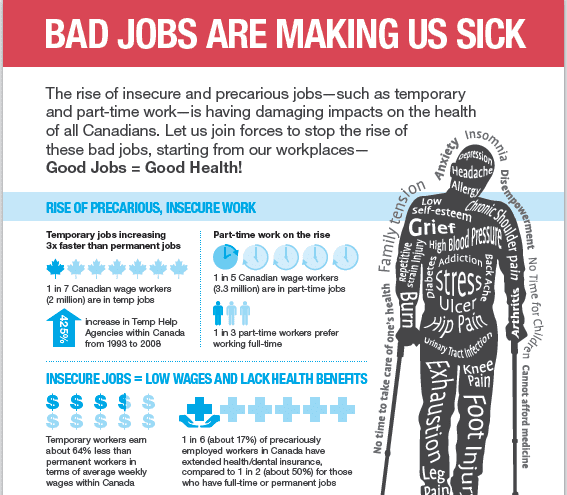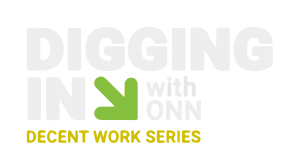
Blog
Five Steps Towards Good Jobs – Archived Content
Our commitment to decent work began many years ago when we committed to being evidence-informed and using data to inform our planning and evaluation processes. This means all data, but in particular data and knowledge that was co-created with community through our community based research program. It became crystal clear to us that bad jobs are making people sick, that pathways to precarious employment are insidious and everywhere among us, and that there are things that can be done to address – even minimally – the impacts of these practices and factors.
Structurally we are a typical non-profit organization. With a budget of almost $12 million, we annually have to apply for, and negotiate, the majority of our funding with numerous government and other funders – ensuring priorities are aligned, reporting against rules and targets, and demonstrating compliance with a vast array of legislative and other requirements. This is all the while working with our boards to meet our own priorities and objectives.
As with so many other nonprofits, the majority of our operating costs are not discretely funded; we manage by charging percentages of these against all funding received. Some of our funders are on the record as saying they don’t care about the Employment Standards Act when we try to get funding to cover off costs related to parental leaves or sick days. Others have flat lined us for years with no acknowledgement that funding is eroded by cost of living increases, while still expecting more and more in terms of service delivery levels and other outcomes every year.
Our ongoing approach is grounded in our research, the Knowledge Translation/advocacy work we do and our own internal commitments and practices.
We identified five steps towards good jobs:
1. Stop the rise of insecure jobs by limiting temporary, part-time jobs to less than 5% of your workforce
2. Promote wellbeing of temporary, part-time employees by offering them fair wages and health/extended benefits
3. Protect temporary, part-time employees by adopting higher than minimum compliance of employment standards and occupational health standards
4. Promote pathways to stable employment for temporary, part-time employees by offering them training and networking opportunities
5. Screen for and adjust risk, and address harmful health impacts from insecure jobs with primary care, by working cross-sectorally with OTs and workers action centres.
Walking the talk to create good jobs in our own organization
We’ve made conscious efforts to create decent work inside Access Alliance. Here are some examples:
– We strive to bundle part-time contracts to provide full-time employment as much as possible. Only 15% of our staff is part-time and only 15% of our positions are non-permanent.
– Regardless of annual renewal of key funding, we’re committed to permanent employment contracts. Many organizations don’t commit to this. In the event that we lose funding, we would have to lay off staff but in the meantime they are permanent with all related rights and benefits.
– We have a professional development organizational plan, dedicating time and money for staff to individually pursue professional development goals, as well as having a program of internal training to support development as well
– We allow 10 instances of staff accrued sick days per year to be utilized for family related emergencies and responsibilities, thus acknowledging that people need support in order to achieve better work life fit.
– All staff must be given 30 working days’ notice of schedule changes. We are vigilant about breaks, lunches and overtime – which is assiduously tracked and taken within the next pay period.
– All staff (permanent, temporary, casual – everybody) make $14/hour. And our new board of directors will be reviewing the possibility of increasing this to $15/hour since we are active in this campaign.
– In our collective agreement, project staff on contract for longer than 12 months get health and welfare benefits, as well as contribution to RRSP. If we know in advance of contract termination that it will be extended beyond 12 months, on a good faith basis we start paying benefits from that point.
Signing on to joint initiatives
Access Alliance works closely with the Workers Action Centre and other stakeholders, supporting any number of initiatives related to precarious employment, poverty, and more. We launched our own call to action – Bad Jobs Are Making Us Sick – which we circulated broadly in the health sector, publicizing the harmful effects of precarious jobs, and calling on public sector leaders to champion an internally driven change movement to reverse this unhealthy trend.
Access Alliance actively participated in the Toronto Neighbourhood Centres (TNC) Decent Work initiative, joining community consultations and signing the Decent Work Charter. We have agreed to review the Decent Work checklist at our labour management committee (management and union) in order to ensure compliance with better/best standards.
Next steps in creating decent work
Our next project is called “Building Health Centre’s Capacity to Promote Good Jobs.” The objectives are to deepen knowledge with CHCs about damaging health and social impacts of precarious jobs; strengthen institutional capacity to promote good jobs for client communities and overcome negative health impacts of precarious work; and finally help mobilize innovative sector specific solution on promoting good jobs. We’re happy to say that even though the funding was for a part-time project coordinator, we were able to combine this with another part-time role and create a full-time position.
Access Alliance is a leader in the field of health care, community services, planning and evaluation, as well as community based research. We think it’s vital we demonstrate possible steps any organization can take to improve conditions of employment – and to be consistent with our values and commitment to advocacy.


